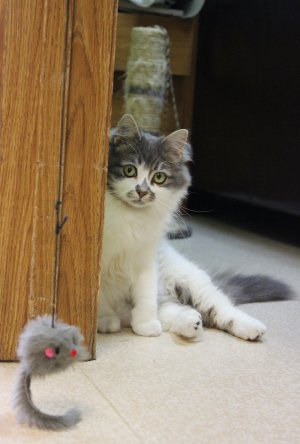
Although many cats are housed indoors and asked to use a litter box, this is not the most “natural” situation for our cats. Cats (and dogs) compared to people have an incredibly sensitive sense of smell (olfactory system). A domestic cat’s sense of smell is about fourteen times as strong as a human’s, which means they can smell things humans are not even aware of. Cats also have a scent organ in the roof of their mouths called the vomeronasal (or Jacobson’s) organ. When a cat wrinkles its muzzle, lowers its chin, and lets its tongue hang a bit, and appears to breathe through their mouth, it is opening the passage to the Jacobson’s organ. This behaviour is called the flehmen response and many cats use this to smell/taste their environment.
So what does this have to do with litter boxes? This illustrates what human’s perceive as fine with a litter box’s smell, location and texture is NOT the same as what a cat may perceive. One of the most common problems veterinarians see in cats, is elimination disorders (urinating and/or defecating outside of the box). In many cases, this inappropriate behaviour is a result of a location and or substrate aversion/preference.
So if my cat Rolex could choose his own litter box these are some of the qualities he may ask for:
- Multiple litter boxes: One for each cat plus one extra (I truly have one cat and 2 boxes).
- Large litter box: ideally one and one half times the length of your cat. Bigger is better!
- Litter box with shallow sides and no lids: Particularly as your cat gets older it is difficult for an arthritic cat to get into a high box. Also, the lid may hold in litter but traps in those horrible smells as well…remember 14 times more potent to the cat! Keep in mind closed boxes hold dust, so cats with asthma should never have a closed box.
- Clean your box at least once daily: The more cats that use the boxes the more frequent they need to be cleaned.
- Unscented litter: Again, what we like and what cats like is very different. If it smells strong to us, you can imagine what it smells like to your cat.
- Litter/Substrate preferences: As much as many people prefer clumping type litters, not all cats do. Some cats prefer a much softer substrate (rugs, clothing, bath mats, shoe racks) to eliminate on. We must be creative to find boxes and materials that match the preferences of our feline friends.
- Location, Location, Location: Some cats prefer open reflective areas such as linoleum, wood or tile floors or bath tubs. If a cat uses a different location than their box, these must be cleaned thoroughly. The odor may soak into the floor sometimes requiring it to be replaced (carpet and padding). Use an enzymatic cleaner like Natures Miracle to clean up accidents.
If you have a cat that has an inappropriate elimination behaviour it may also have an underlying medical problem. If the behaviour persists, consult your veterinarian for a thorough examination and consultation to best solve this complex, yet common issue.
